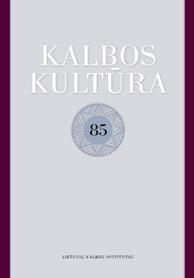Maironis ir Maironiai, Maironiškiai
Maironis and Maironiai, Maironiškiai
Author(s): Ona KažukauskaitėSubject(s): Baltic Languages
Published by: Lietuvių Kalbos Institutas
Keywords: toponym; pseudonym; personal name;
Summary/Abstract: The data from the card files of the Onomastics department at the Institute of the Lithuanian language shows that the place names Maironiai, Maironiškiai and Maironiškis are not old Lithuanian names. In 1927 place names Maironiai and Maironiškiai were given to villages in present-day regions of Joniškis, Kelmė and Zarasai when implementing the Land Reform Law (Žemės reformos įstatymas) parcelling out the land of big estates. Šakių palivarkas (Šakiai folwark) in Lapės rural district in Kaunas county which belonged to Kaunas seminary was renamed as Maironiškio palivarkas (Maironiškis folwark) in 1928 in honour of Maironis who at that time was a rector of the seminary. As can be seen from the question naires of place name registration dating from 1935–1937, respondents recall that new place names were created in honour of the poet Maironis. There is a parallel with another case in 1927 when the Lithuanian authorities took a decision to give the name Vaižgantai to two villages in honour of the Lithuanian writer Juozas Tumas-Vaižgantas, who was not related to these places.The analysis of place names shows that the priest and poet Jonas Mačiulis, who signed his poem „Ne teip senovės žmonės gyveno“ (published in 1891) as Maironis for the first time could not have create his pseudonym on the basis of the Lithuanian place name as some researchers suggest. The most probable explanation could be Bernardas Brazdžionis version that the young poet had the idea to use the surname of the philosopher from the Middle Ages Franciscus de Mayronis as his pseudonym when he studied his works in Saint Petersburg Imperial Roman Catholic Theological academy during his first years of studies in 1888–1890.
Journal: Bendrinė kalba (iki 2014 metų – Kalbos kultūra)
- Issue Year: 2012
- Issue No: 85
- Page Range: 113-120
- Page Count: 8
- Language: Lithuanian

